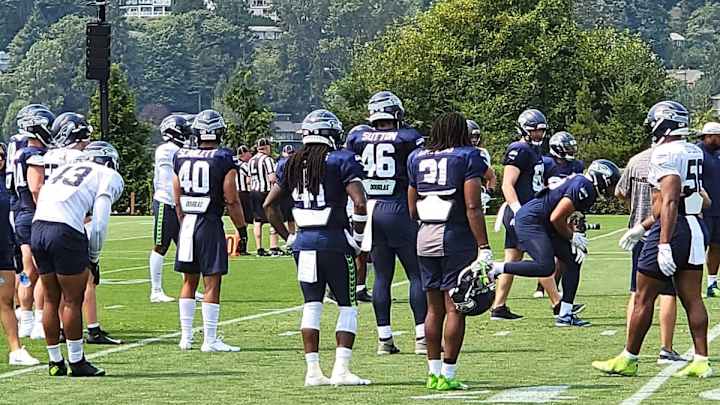DeeJay Dallas or Alex Collins: Which Seahawks RB Has Inside Track on Third Down Role?

As the Seahawks get a breather from training camp on Thursday, a very important role within their running back room remains quite the mystery. With Travis Homer on the physically unable to perform list with a lingering calf injury, the battle for the team's third down duties have come down to second-year man DeeJay Dallas and veteran Alex Collins.
It's early, of course, and Homer may still factor into the competition at some point. On Wednesday, Seahawks coach Pete Carroll offered some potentially good news regarding the health of his third-year running back.
“He’s in phenomenal shape," Carroll revealed. "He’s got to get to where he’s really confident in his legs and can go. We’re just kind of playing off of him right now. Like I said, he’s in phenomenal condition and all, we just got to get him ready to play football.”
How long it takes for Homer to get to that point remains to be seen. It could be as early as next week or dawdle well into the preseason. If it's the latter, it may spell the end of his time in Seattle. And in that case, the role will almost certainly go to one of Collins or Dallas.
Today, we'll be breaking down the competition between the two running backs over five categories: track record, upside and team control, pass protection, pass catching and, of course, running ability. For a broader landscape of what the third down back competition will entail, Seahawk Maven's Corbin Smith accounted for Homer in his preview back in late July.
Track Record: Advantage Collins
This one is fairly straightforward. Though Collins missed nearly two seasons following his arrest in March of 2019, his time in Baltimore speaks for itself. Appearing in 25 games for the Ravens, he rushed for 1,384 yards and 13 touchdowns. In just three sporadic outings with the Seahawks following his return to the NFL last year, he scored twice on 18 carries. Dallas had some success in his rookie campaign, but there isn't enough to go on just yet. Even dating back to his three years in college, he didn't post eye-popping numbers that outweigh anything Collins has done to this point.
Upside and Team Control: Advantage Dallas
Collins certainly boasts some upside given his track record, but this category is Dallas' all the way. He still has three years left on his rookie contract, whereas Collins comes in on a one-year deal signed in the offseason. Given that Dallas already made an impact as a fourth-round selection this year, there's quite a bit to dream on with his potential.
Pass Protection: Push
This is an area that Homer particularly excels at and both Collins and Dallas struggle with. Per Pro Football Focus, Dallas only had 17 pass blocking snaps in 2020, though he struggled mightily in that small sample size. His college tape is not very encouraging on that front either. As for Collins, he's been equally poor despite having more NFL seasoning. There may be hope for Dallas to overcome his woes in this facet since it's still so early in his career, but this category is about even between the two right now. Both running backs offer roughly the same in pass protection, which is to say not much at all.
Pass Catching: Advantage Dallas
Reeling in 17 of 20 targets for 111 yards and a touchdown last year, Dallas should be the answer here. He wasn't a massive producer through the air at the University of Miami, but the athleticism and explosiveness in open space is apparent. To be fair, Collins is no slouch as a pass catcher either. In 39 career games, he's averaged 1.3 receptions at a clip of 7.6 yards per catch. However, for what Dallas was able to do in 2020 and what the athletic traits indicate, the Miami product holds the edge.
Running Ability: Advantage Collins
Both players are legit threats in between the tackles and on the outside, but Collins' history is what gets him the nod here. It's hard to argue against someone who's already posted a near 1,000-yard season in his career and continues to impress his coaching staff amidst his return to action. Nevertheless, this could easily become a push or even lean towards Dallas in a matter of weeks.
Overall: Advantage Dallas
Yes, they split the categories 2-2-1 here, but pass catching and pass protection are ultimately the two most important elements of the third down role. While Dallas is equally below average as a blocker as Collins is, what he offers as a receiver out of the backfield is far more valuable to the role than anything his direct competitor provides. Collins should still be able to etch out a role for himself as a hedge for Chris Carson and Rashaad Penny, both of whom have not necessarily been the models of availability at times, but the third down job is probably not the best use of his abilities.

Reporter and editor covering the Seattle Seahawks for All Seahawks. Host of Locked On Mariners.
Follow danegnzlz